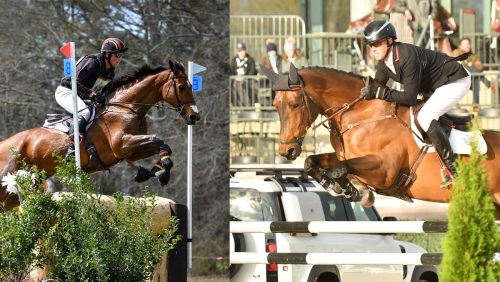In 2006, Chronicle columnist Denny Emerson looked at the awesome results of the German riders at the 2006 World Equestrian Games in Aachen, Germany, and asked what factors contribute to these prototypical young German riders so often defeating their American counterparts.
As the 2014 Alltech FEI World Equestrian Games continue, with German teams taking gold in dressage and eventing, and gold and silver individual medals in those sports, too, it’s worth taking another look at Denny’s thoughts from eight years ago.
What are the ingredients of the German equestrian “success machine” that drove them to win six gold medals at the 2006 World Equestrian Games to our two?
What lands them so consistently, decade after decade, at the top of the Fédération Equestre Internationale leader board? What makes their sport horse breeding industry the envy of all other horse-producing nations?
There’s a saying that if you ask the same question of 100 people you’ll get 100 different answers, but I found that my question elicited remarkably similar responses. I think broad based questions often lead to some stereotypical conclusions, and while that may be true with some of these that follow, there’s a fair bit of accuracy here as well.
- “Perhaps it’s because Fritz and Heidi have that scary World War II movie German accent! Their horses don’t dare disobey!”
- “The German culture fosters more of a hard work ethic than does the affluent American culture, and Fritz and Heidi have grown up believing that their level of success is directly related to their expenditure of effort.”
- “Germany is geographically located in the epicenter of FEI horse sport, in easy proximity to other great horse breeding and showing countries like France, the Netherlands, Belgium, England and Ireland. America is remote.”
- “German riding lessons are structured, systematic, regulated and consistent. Young German riders are taught to ride correctly from Day 1. Young German riders are more respectful of authority and discipline, are unlikely to question their instructors, or wish to discuss and negotiate what they are being taught.”
- “German horse shows are cheaper and easier to get to than American shows, partly because there’s no mileage rule stifling competition between shows, and partly because Germany is a small country compared to the United States.”
- “Fritz and Heidi don’t get lured away from the FEI disciplines by other forms of riding like western, hunters, natural horsemanship, and saddleseat. They’re more likely to stick to the classical disciplines.”
- “Germany is noted for the kind of engineering élan that produces cars like the Mercedes and BMW. Precision, attention to detail and an analytical approach to problem solving are indigenous German cultural traits. They bring those same traits to figuring out how to win FEI medals, and Fritz and Heidi are beneficiaries of that mindset.”
- “German children aren’t as soft and coddled and spoiled as American children. If the instructor takes away stirrups and puts pressure on them to acquire correct dressage basics and to develop the famous ‘independent seat,’ they are more likely to deal with the pressure than are Sally and Bill.”
- “Sally and Bill want to have their parents buy success; Fritz and Heidi go out and earn it.”
The list goes on, but these are typical of the answers I received to the question, “Why do Fritz and Heidi beat Sally and Bill?”
It’s by no means all doom and gloom on our side of the Atlantic Ocean. Don’t tell Beezie Madden she can’t lick the Germans on their own turf. Don’t try to convince George Morris that his team couldn’t win the Samsung Super League. Don’t tell Frank Chapot he couldn’t breed a world beater in Gem Twist. Don’t tell Bill Steinkraus or Bruce Davidson or Tad Coffin or Joe Fargis or David O’Connor that “back in their day” they couldn’t relegate the Germans to the back of the line.
When we had those strong U.S. Equestrian Team programs in Gladstone, N.J., and South Hamilton, Mass., under Bert de Nemethy and Jack Le Goff, we were able to focus our competitive energies to a fine cutting edge that made us competitive against every other nation.
ADVERTISEMENT
But the USET couldn’t afford to keep those enormously expensive centers afloat for only a handful of U.S. riders, and I also think that our riders were becoming too intolerant of structure and discipline to be ruled by that system.
To quote William Butler Yeats, “Things fall apart, the centre cannot hold…” Sometime about the mid-1980s, our national USET riding centers “fell apart,” and we gravitated into more of a free enterprise system than I suspect is the case in Germany, where their National Equestrian Federation has hundreds of thousands of members.
Despite the fact that right now, in the early 21st century, the Germans seem to be rulers of the riding world, there’s a great opportunity implicit in all of this.
If I were a young American rider, in my 20s, say, with aspirations to ride at the highest levels, and I knew that the German system was consistently producing horses and riders at the top of the international scale, I would avidly study the system.
I’d be looking for anything I might beg, borrow, steal or adapt, and I’d dig in, suck it up, and struggle to raise my game to a whole new plane of excellence. There’s an old saying that deals with such a reality. “If that’s what it takes…”
Denny Emerson rode on the 1974 World Championship gold-medal eventing team. He served as the U.S. Eventing Association president twice and won the USEA Wofford Cup for his lifetime dedication to eventing. At his Tamarack Hill Farm in South Strafford, Vt., and Southern Pines, N.C., he trains horses and riders and stands stallions. An original Between Rounds contributor, Emerson began writing his column in 1989.















